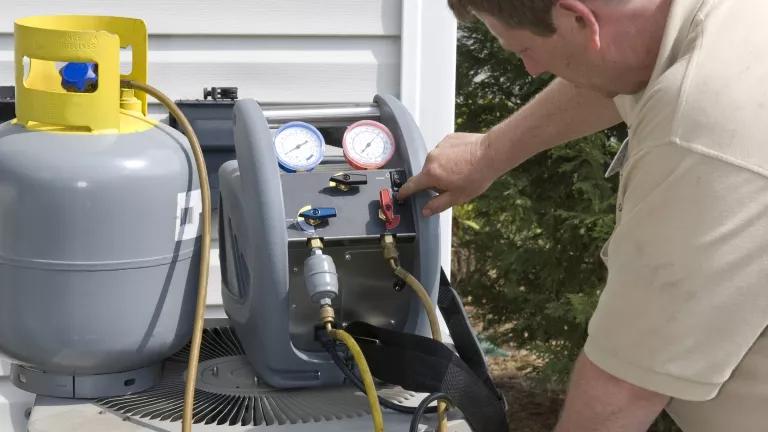NRDC Wraps Up the 2022 Washington State Legislative Session
Despite ongoing challenges from the Covid-19 pandemic and remote legislative operations, we concluded Washington State’s short legislative session with notable successes for the climate and environment.

Guest Blog by Kate White Tudor, NRDC’s representative in Olympia, WA
Despite ongoing challenges from the Covid-19 pandemic and remote legislative operations, we concluded Washington State’s short legislative session with notable successes for the climate and environment.
NRDC expert Dylan Sullivan joined me in early engagement to shape legislation to reduce methane emissions from landfills. Methane is a super-potent greenhouse gas, and according to the latest IPCC report, each pound emitted into the atmosphere produces, over a twenty-year period, warming equal to more than 80 pounds of carbon dioxide. Landfills emit methane because organic materials such as food waste and landscaping waste biodegrade without oxygen, and methane is a product of decomposition. Modern landfills have been required to capture methane for decades, but Washington State has several older landfills that have fallen into a loophole outside of regulation. Representative Davina Duerr’s bill HB 1663 will require them to install methane capture equipment to ensure the methane is either destroyed efficiently by burning it on site (flaring) or by using it to displace fossil fuels in a truly carbon neutral way. This new law requires that any process to use the gas to replace fossil fuels does not allow it to leak—since methane leaks from the gas system are another significant contributor to climate pollution.
Reducing methane pollution is one of many benefits of an ambitious new organic waste management law passed in 2022. NRDC’s Darby Hoover and I partnered with Zero Waste Washington and Climate Solutions to advocate for HB 1799, sponsored by Rep. Joe Fitzgibbon, which establishes a statewide program to reduce food waste. The bill includes many complimentary strategies: It establishes the Washington Center for Sustainable Food Management within the Department of Ecology to oversee the program. It revises state liability laws to ensure that appropriate surplus food (such as wholesome food that is past its “best by” date) can be donated to combat hunger without risk to the donor. It requires businesses that generate significant amounts of food scraps or other organic waste to collect it for composting, instead of sending it to landfills. Local governments will expand organic waste collection and set up additional composting capacity. The law sets up incentive programs to encourage municipalities and farmers to use the compost produced by the program.
Governor Inslee proposed a suite of ambitious bills to reduce emissions from our homes and other buildings. The fossil gas industry fought hard to defeat HB 1767, which would have allowed utilities to provide incentives that make it easier and more affordable for interested customers to install clean electric appliances as replacements for polluting gas furnaces, water heaters and stoves. Industry lobbyists also defeated HB 1770, which would have given local governments the option to adopt carbon-reducing building codes. However, our state team of building decarbonization advocates, including NRDC’s Alejandra Mejia-Cunningham, succeeded in passing Senator Joe Nguyen’s SB 5722, which modestly expands state requirements to increase the efficiency of existing commercial and multi-family buildings. Legislators also passed Rep. Alex Ramel’s HB 1280, which makes it a policy of the state to reduce carbon emissions from public buildings and requires the state to consider all-electric options for designing state owned or leased buildings.
Washington’s most historic climate legislation of 2022 was the Move Ahead Washington package of transportation investments, which allocates over $5 billion generated by the state’s Climate Commitment Act over the next sixteen years to reduce carbon emissions through investments in transit, including free transit for children under 18 statewide, bike and pedestrian projects, electrifying ferries, high-speed rail design, and more. The supplemental transportation budget included substantial funding to expand electric vehicle (EV) chargers statewide.
However, there is still more to do in reducing climate pollution from transportation, the largest CO2-emitting sector in Washington’s economy, so the state is planning additional regulatory measures for 2022. The Department of Ecology has begun rulemaking to adopt a suite of clean-air act measures already in effect in other western states. The Heavy-Duty Omnibus rule will require manufacturers of diesel engines to design cleaner-burning engines, reducing harmful smog forming pollution by 90%. The Advanced Clean Cars 2 rule will build on rules adopted in 2021 and provide a pathway to 100% zero-pollution passenger car sales by 2035. Finally, the truck fleet reporting rule will help the state identify the most polluting vehicles and guide electrification programs to replace them first.
We also anticipate continuing our advocacy for electrifying buildings, including participating the gas transition proceeding at the Washington Utilities Commission. We plan to strategize with coalition partners to expand the statewide organic waste management system. Our work to support vehicle electrification through rebates and charging infrastructure will continue, as well as work to educate lawmakers about policy to ensure electric vehicles pay for road use while maintaining incentives to reduce vehicles’ carbon and smog-forming pollution.
Stay tuned for updates on our progress in the coming months!



